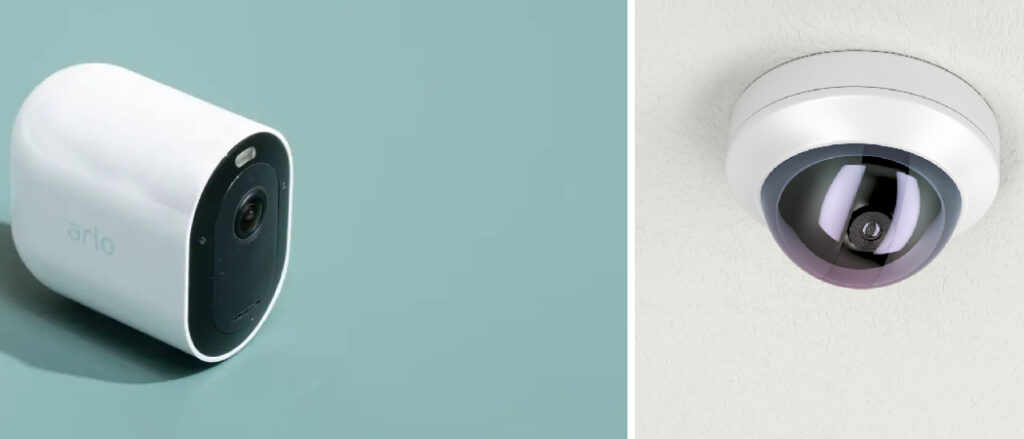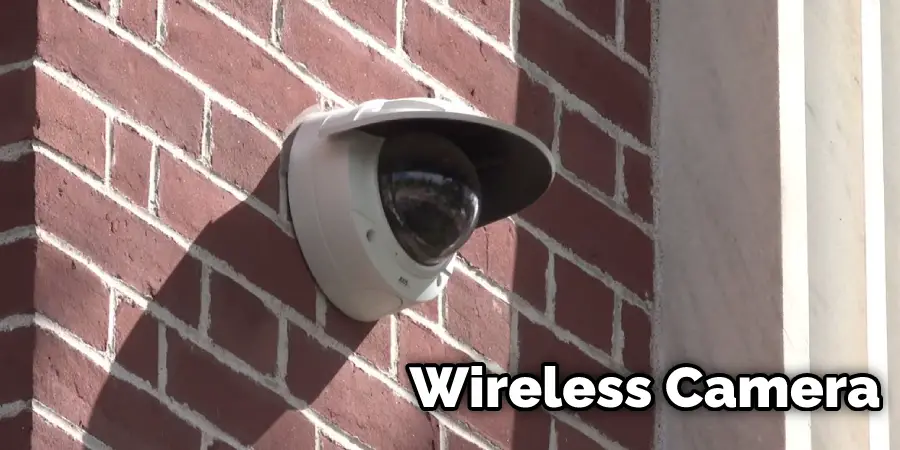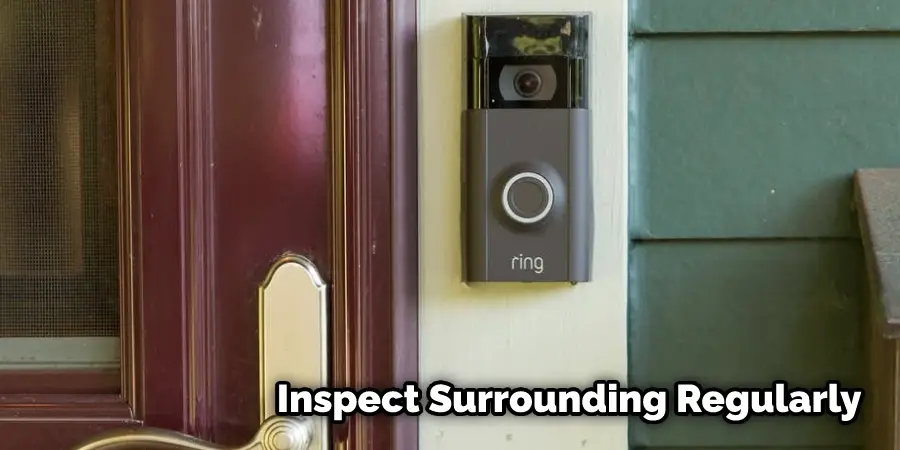Do you ever feel like someone is watching you? It could be that some nosy neighbor has set up a wireless camera, but how do you know for sure? If so, what can be done to shield yourself from its prying gaze?
In this blog post, we will explore the issue of wireless cameras, why they have become increasingly popular and sophisticated in recent years, as well as practical steps to protect yourself and block out their signal.

Even if your home or office isn’t under surveillance now – with basic knowledge of wireless camera security protocols, anyone can fortify themselves against such invasions quickly and easily. So keep on reading to learn more about how to block wireless camera signals.
Understanding the Wireless Camera
Wireless cameras, also known as Wi-Fi cameras or IP cameras, are cameras that transmit video and audio signals wirelessly to a receiver, which is usually a computer, smartphone, or remote monitoring device. Here’s a brief overview of how wireless cameras work:
- The camera captures video and audio: Wireless cameras capture video and audio using a lens and microphone.
- Encoding: The camera then encodes the video and audio signals digitally. This digital format is transmitted wirelessly using Wi-Fi or Bluetooth technology.
- Wireless transmission: The wireless camera transmits the encoded video and audio signals using radio frequency waves. These waves can travel through walls and other obstacles and can be received by a remote device.
- Receiving device: The receiving device, a computer, smartphone, or remote monitoring device, decodes the video and audio signals and displays the video on the screen.
- Internet connectivity: Many wireless cameras are also connected to the internet, which allows the user to access the camera remotely from anywhere in the world, using a web browser or a mobile app.

It’s important to note that different wireless cameras can use different wireless protocols and frequencies, such as 2.4 GHz or 5 GHz. Some cameras can also use encryption to secure their transmissions, making it more challenging to intercept or block the signal.
10 Ways how To Block Wireless Camera Signal
1. Identify the Sources of Interference:
First and foremost, it is important to identify the sources of wireless camera signals. This can be done by visually inspecting the environment for any suspicious devices, such as cameras or routers, or by using a wireless frequency scanner to detect any unauthorized transmissions.
Also, physical barriers such as walls and ceilings can be used to block out the signal. Then, radio frequency (RF) interference and other electronic devices can be used to block out the signal.
2. Use a Faraday Bag or Cage:
A Faraday bag, also known as an RFID-blocking bag, is a pouch or container made from specially-designed material which blocks out all radio frequency signals within its walls. You can completely block out its signal by placing a wireless camera inside one of these bags.

3. Use a Wireless Jammer:
Wireless jammers, also known as radio frequency jammers, are electronic devices that emit radio frequency signals at frequencies that interfere with the wireless camera’s signal. This will prevent any video or audio from being transmitted to the receiving device and effectively blocks out the camera’s signal.
4. Use a High-Gain Antenna:
High-gain antennas can be used to direct and amplify the radio frequency signals, allowing you to cancel out any external noise and block out any unwanted wireless camera signals.
5. Change Your Wi-Fi Network’s Name and Password:
Changing your Wi-Fi network’s name and password makes it much more difficult for someone to access your wireless camera. By using a strong, unique password, you can help protect yourself from any potential intrusions.
6. Change Your Wireless Network’s Channel:
Wireless networks typically operate on specific frequencies or channels. By changing the channel your wireless network is on, you can help prevent any interference from external wireless devices.
7. Use a Wireless Signal Detector:
Wireless signal detectors are electronic devices that detect and measure radio frequency signals within a certain area. This can be used to identify any rogue wireless cameras or other unauthorized transmissions in the vicinity.
8. Use Encryption to Secure Your Wireless Camera:
By using encryption, you can secure your wireless camera’s transmission from any potential hackers or intruders. This will make it much more difficult for someone to access the video and audio from your wireless camera without your permission.
9. Place Your Wireless Camera Behind an Object:
If you have a physical object that is blocking the line of sight between your wireless camera and its receiving device, this can help reduce or block out any radio frequency signals.
10. Use a VPN to Access Your Wireless Camera Remotely:
Using a virtual private network (VPN) to access your wireless camera remotely is one of the most secure ways to protect it from being accessed by unauthorized personnel. VPNs provide a layer of encryption that helps to keep your data safe and secure, even when you’re accessing it from an untrusted network.
By following these steps, you can help ensure that your wireless camera’s signal is protected from any potential interference or intrusions. With the right precautions and security measures, you can rest assured that your wireless camera’s signal is safe from unauthorized use.
Troubleshooting Tips on How to Block Wireless Camera Signal
If you face any problem while blocking a wireless camera probable solution given below would be helpsome:
Check Your Wi-Fi Connection:
If the camera is on a channel that is not connected to any other device, it will be hard to detect and block its signal. Make sure that all devices in your home are connected to the same network, so you can easily identify and block a wireless camera’s signal.
Check if The Camera Is Transmitting on A Frequency that Can Be Blocked:
Some wireless cameras use frequencies that cannot be blocked, such as Wi-Fi or Bluetooth. If the camera is using one of these frequencies, you will not be able to block its signal.
Make Sure that Your Blocking Device Is in The Right Place:
If you are using a blocking device, make sure that it is in the right location to block the camera’s signal. The device should be as close to the wireless camera as possible in order to block its signal effectively.
Try Different Blocking Techniques:
There are several methods available for blocking wireless cameras. Try different techniques to see which one works best for blocking the camera’s signal.
Update Your Blocking Device:
If you are using a device to block the wireless camera’s signal, make sure that it is updated regularly. Newer cameras often use more advanced frequencies, so you may need to update your blocking device in order to keep up with the latest technology.
Inspect Your Surroundings Regularly:
If you suspect that someone is using a wireless camera to spy on your home, it’s important that you inspect your surroundings regularly. Look for any signs of a camera or other suspicious devices. You can also use an RF detector to help detect any nearby wireless cameras.

By following these tips, you should be able to effectively block a wireless camera’s signal and protect your privacy.
Important Ethical and Legal Considerations to Keep in Mind
When it comes to blocking wireless camera signals, there are important ethical and legal considerations to keep in mind. Blocking a wireless camera signal without the owner’s consent can violate their privacy and lead to legal consequences.
Here are some ethical and legal implications of blocking wireless camera signals:
- Invasion of Privacy: Wireless cameras are often used for security purposes like monitoring homes or businesses. By blocking their signal, you could be preventing the camera from performing its intended function. However, if the camera is installed in a place where it invades your privacy or others’ privacy, you may have a valid reason for blocking its signal.
- Safety Risks: Blocking a wireless camera signal can create safety risks. For example, if the camera is used for security purposes, blocking the signal could make it easier for burglars or intruders to gain access to a property undetected.
- Legal Consequences: In some jurisdictions, blocking wireless camera signals is illegal. If you are caught blocking a camera signal without the owner’s consent, you could be subject to fines or even imprisonment.
- Importance of Respect: It’s important to respect other people’s privacy when it comes to wireless cameras. If you believe that a wireless camera is invading your privacy, it’s best to discuss the issue with the camera owner and try to come to a mutually agreeable solution.
- Alternative Solutions: There may be other ways to address privacy concerns instead of blocking a wireless camera signal. For example, you could install curtains or blinds to block the camera’s view or move the camera to a less intrusive location.
In summary, blocking wireless camera signals should only be done after careful consideration of the ethical and legal implications. It’s important to respect other people’s privacy and try to find alternative solutions to address privacy concerns.
Security Concerns Regarding Wireless Cameras
Wireless cameras have become increasingly popular in recent years due to their convenience and ease of use. However, they also come with some security concerns, including the risk of being hacked. Here are some of the security concerns regarding wireless cameras:
- Weak Passwords: Many wireless cameras come with default usernames and passwords that are easy to guess or crack. If a hacker gains access to your camera’s username and password, they can potentially view and record your footage.
- Unsecured Wi-Fi Networks: If your wireless camera is connected to an unsecured Wi-Fi network, it’s easier for hackers to intercept the camera’s video and audio signals. They can also use the network to gain access to other devices on the same network.
- Firmware Vulnerabilities: Wireless cameras run on firmware, which is a type of software that controls the camera’s functions. If the firmware has vulnerabilities, hackers can exploit them to gain access to the camera’s settings and footage.
- Remote Access: Many wireless cameras allow remote access, which means you can view the footage from anywhere in the world using a web browser or mobile app. However, this also means that hackers can potentially gain access to your camera from anywhere in the world, as long as they have the right credentials.
- Physical Security: If the wireless camera is not physically secured, a hacker could potentially steal the camera and gain access to the footage stored on the camera’s memory card.
To reduce the risk of being hacked, it’s important to take steps to secure your wireless camera. This includes using strong passwords, securing your Wi-Fi network, updating your camera’s firmware regularly, and limiting remote access to your camera. It’s also a good idea to use a reputable brand of wireless camera, as they typically have stronger security measures in place.
Conclusion
The ability to block wireless camera signals is a valuable tool for protecting your privacy and security. By understanding the different types of camera technologies and their signal ranges, you can make informed decisions about which products are best suited to protect your space from unwanted surveillance.
Additionally, by following simple steps such as changing default passwords or disabling remote access features on devices with built-in cameras, you can further ensure that no one has unauthorized access to view images or footage captured within your home or business premises.
With these tips in mind, you can confidently take the necessary measures to safeguard yourself against any potential intrusions into your private life. Thanks for reading this article about how to block wireless camera signal.
